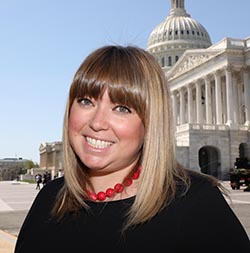As people across the nation prepare to take to the streets of Washington, D.C., and more than 400 cities to champion the value of science on April 22 (Earth Day), Rutgers’ Office of Federal Relations has a year-round mission to advocate for scientific research.
The Office of Federal Relations, located just steps from the U.S. Capitol Building in Washington, D.C., works closely with administrators, faculty, staff and students throughout Rutgers to build relationships with key federal policymakers that will help advance the important scientific work underway across the university. The office works closely with the New Jersey congressional delegation and national associations of higher education to be a voice for Rutgers and for science on a national level.Francine Newsome Pfeiffer, who directs the Rutgers Office of Federal Relations in Washington, D.C., and Alexandria Hermann, associate director, talked with Rutgers Today about the importance of federal investment in science and the role their office plays in advancing research at Rutgers.
How does Rutgers advocate for scientific research at the federal level?
Newsome Pfeiffer: Early and often.The Rutgers Office of Federal Relations in Washington, D.C., advocates year-round for the university’s federal priorities, especially for the federal investments that support our students and faculty. Funding for university-based scientific research is a major concern. We visit regularly with our New Jersey members of Congress and their staff to talk about the federal agencies and programs that fund research at Rutgers, and often bring faculty, staff and students so they may speak directly about their federally funded research and why it matters. We also arrange congressional visits to campus so our elected officials can see research in action, whether it’s a lab working on Alzheimer’s research funded by the National Institutes of Health, an outdoor bridge testing facility at the Center for Advanced Infrastructure and Transportation or a visit to the Coastal Ocean Observation Lab for a real-time look at ocean data. It’s important to keep our congressional offices informed about the exciting scientific research underway at Rutgers because so much of it wouldn’t be possible without federal funding.
Can you give examples of how that advocacy has been successful in advancing scientific research at Rutgers?
Newsome Pfeiffer: In 1997, Rutgers received $94 million in federal research funding. In 2007, our federal research funding total climbed to $195 million. This year, our federal research funding is at the highest level yet, totaling $331 million – which can be attributed, in part, to the historic 2013 integration between Rutgers and the University of Medicine and Dentistry of New Jersey. Persistent advocacy for federal investments in scientific research have fostered strong, bipartisan support for research at the National Institutes of Health, the National Science Foundation and many other federal agencies. We have champions in Congress from both sides of the aisle who are outspoken about the need to invest in innovation. And our scientists have shown that they can compete for a growing share of these federal dollars. Rutgers research expenditures have grown 250 percent in 20 years.
Does Rutgers work with other universities on advocacy?
Hermann: Absolutely. As a leading public research university we are part of several important national associations with a shared interest in strong partnerships with the federal government to advance innovation across the country. Amplified, unified voices are the best way to be heard on Capitol Hill, which is why we coordinate with our government affairs counterparts at universities, associations and scientific societies when lobbying for robust funding levels for research, even in times of fiscal restraint. In addition, research doesn’t happen in a vacuum. Rutgers faculty members frequently work in partnerships spanning multiple universities across the country, so we work specifically with those universities to showcase our collaborations and coordinate advocacy. Did we mention that our office in Washington, D.C., is shared with Princeton University’s Office of Government Affairs? They are terrific neighbors and partners in making the case about federal research and education investments with our New Jersey members of Congress.
Why is the federal investment in science so important?
Hermann: Strong, stable federal funding is essential if the United States wishes to continue to be the global innovation leader. Basic research has led to countless scientific discoveries – discoveries that save lives, serve as a driver of our economy and are critical to a prosperous future for the country. Life-saving vaccines and drugs, personal computers and smartphones all came about as a result of research in labs and centers funded by the federal government, and there would be a dark cloud hanging over the timeline of American innovation if the federal government failed to see an advantage for the investment in science and in our students, the scientific workforce that will drive innovation well into the future.
For media inquiries, contact Alexandria Hermann at is 202-220-1338 or hermann@oq.rutgers.edu.




